Feature Story
Worth the Wait: Newlywed Refugees Love Remains
For seven years, Congolese refugees (and newlyweds!), Mbimbi and Goreth, didn’t know if they would ever see each other again. Separated by continents, Mbimbi was stuck in Burundi while Goreth resettled and began her new life in America. In spite of the long wait, the two of them never lost hope, their love growing by the day.
“No one can do what Goreth did,” Mbimbi said about his wife’s commitment not to remarry. Instead, Goreth chose to hold onto hope, believing God was faithful and would bring Mbimbi back to her in America.
Where It All Began
In 2008, Goreth was a wife and mother living in Goma, a city in Democratic Republic of Congo (DRC). Her day began like any other day – she woke up, brushed her teeth, made some tea and headed to the market to sell clothes at her stand. It became a day she would never forget when “the fighting broke out.” She recalls, “My daughters, [Christine and Valentine], and I started running, and we found a way to get past Goma to Burundi. That’s when I started my life as a refugee. My [first] husband died in the fights.”
Goreth and her daughters ended up in a Burundian town filled with other refugees. Upon arrival she shares, “I felt relief because of sleeping in a house and churches help us and Christians help us.”
While Goreth and her daughters were refugees in Burundi, Mbimbi was working as an auto mechanic in Baraka, a city south of Goma in DRC.
Pressure
In 2014, an armed civilian group put pressure on him to “join them for the fight and to be a soldier.” These groups were once formed to defend the Congolese against rebel armies. But tragically, they have created more chaos and violence than protection for the Congolese people.
So, when Mbimbi refused, they threatened him. With a target on his back, he reflects, “That was the night my uncle called me and said, ‘They are looking for you.’” That same day, “I told fishermen what happened and ask if they can help me to another place. They hide me in the boat and carry me down river.”
From there, Mbimbi went to Boku, where “they [gave him a] motorcycle to go to Boda.” From Boda, he traveled to Burundi where he ended up in the same town as Goreth.
Having arrived in the same town six years apart, Goreth and Mbimbi met, by chance, while filling out paperwork to earn refugee status. Goreth was farther along in the process while Mbimbi was just beginning his paperwork. Despite crossing paths at different stages in their journey to flee DR Congo, they formed a connection “and began a relationship.” Within a year, they were married.
Oceans Apart
Even though they were living in a safer town than the cities they had fled, Goreth and Mbimbi couldn’t escape the violence. In 2015, their Burundian town experienced fighting; so, when Goreth was given the opportunity to go to America, she agreed. The catch? Mbimbi wouldn’t be able to join her and her daughters. It was a bag of mixed feelings for Goreth.
“To be a refugee is not an easy thing,” she says. “It’s just a thing you have to do to pray to God. God helped me because I became strong and fight for the kids to grow up…in a safer place.”
Leaving behind her new husband, Goreth and her daughters traveled to America not knowing when and if they would ever be reunited with Mbimbi. When they arrived in the U.S., their new lives began right away.
Goreth remembers they were greeted by World Relief staff and volunteers. “[They] had already found an apartment for us,” she recalls.
Staff and volunteers came alongside Goreth and her kids, taking them to doctors appointments and helping Goreth find a job in manufacturing, packing hospital-grade linens. Goreth expresses sincere gratitude for all of World Relief’s help, especially in “the first three to six months.”
Even though Goreth felt “sad sometimes” she shared with deep conviction that she “still waited and prayed to God” for Mbimbi.
At Last, Together Again
Finally, in July 2022 both her and Mbimbi’s prayers were answered when he was resettled to America. Many were there to witness the tearful reunion at Chicago-O’Hare as Goreth and Mbimbi finally embraced each other after their 7 year separation.
Now reunited with his wife, Mbimbi is taking a World Relief “Zoom job class and language class.” He takes comfort in knowing that once his job and language classes are complete, he can still count on World Relief.
“It’s not like they abandon you,” he said. “If you still need something, they are there to help.”
Mbimbi and Goreth are currently renting a one-bedroom apartment. Now able to dream together, the couple says, “for the future, we are praying to God that we can get our own house.”
Knowing that God has provided for them before, they are trusting, through prayer and perseverance, that anything is possible!
Converging Crisis
As crises converge, and global conflict forces more people to flee their homes, it takes all of us, to move forward together, to build peace and lasting change. When you give today, you help us build peace in places like DR Congo while also welcoming those like Goreth and Mbimbi who have been forced to flee to the United States.
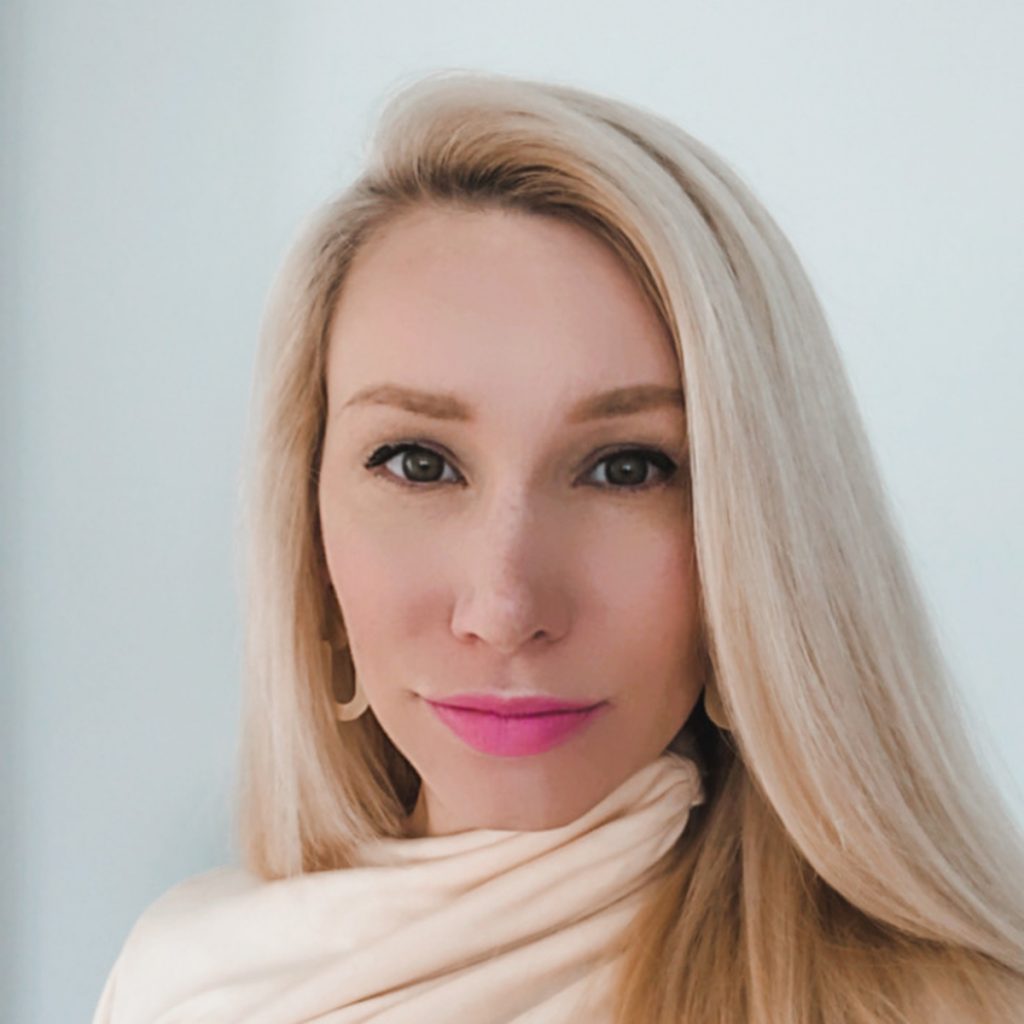
Michelle Visk is a freelance writer passionate about sharing compelling stories of individuals impacted by nonprofits throughout the world. In addition to writing for nonprofits, she recently launched her own interior design e-consulting business, geared at making interior design more accessible to the middle class so everyone can create a home they love. When she’s not writing or doing e-consults, she enjoys spending the majority of her time with her husband and pouring into her two feisty little girls (ages 3.5 and 5) as a stay-at-home-mom. Before becoming a stay-at-home mom, Michelle worked in ministry for 10 years, serving as a Communications Director for a multi-site church. She holds a BS from Butler University.
1 Year After Kabul…Farishta’s Story
Today marks one year since Kabul fell to the Taliban. Read Farishta’s captivating story as she fled Afghanistan with her family, and was resettled in North Texas by World Relief.
Farishta’s Story
Farishta and her husband Omid Shah lived normal lives in Afghanistan, both with successful careers in the medical field. She and Omid Shah come from generations of doctors and medical professionals. Farishta received a Bachelor’s degree in Pakistan, and after marrying Omid Shah, moved to Kabul where she completed another medical degree. Shortly after, she and Omid Shah celebrated the birth of their first son, and were happy with their lives in Afghanistan. Before the Taliban came, she desired to move into a specialized practice, but now, everything she would have worked for in Kabul is destroyed. Her husband practiced and studied medicine in Pakistan for many years, then became a general surgeon, eventually moving to work for the U.S. army.
A History of Displacement
August of 2021 marked the fourth time in Farishta’s family history that they had to flee Afghanistan for their own safety. Farishta can recall as a child fleeing to Pakistan during the first Taliban invasion. As Farishta’s mother fled from the Taliban with 3 children, they left everything behind. While living in Pakistan, they experienced many hungry nights, as it was hard for them to start their lives over. Her mother eventually brought them back to Afghanistan after five years when the country had become safer. She vividly remembers returning to her empty home in Afghanistan. Everything that was left in their home when they fled was stolen.
Life became normal back in Afghanistan. All of her brothers and sisters, despite the trauma of displacement, grew up to become extremely successful. Her own brother became a college professor, spokesperson for the Republic of Afghanistan, and a policy maker. Her husband’s job for the U.S. military as well as her brother’s profession, would end up placing a target on their backs during the next Taliban invasion.
August 15th, 2021
In early August of 2021, they celebrated their son’s 2nd birthday. 5 days later everything was different.
She described to me the day the Taliban invaded. That morning she awoke to what seemed like a normal day. She was busy caring for her son, and was concerned with going to the market and buying milk. On her way to the market, she saw those around her running and thought “what is happening? Why is everybody running?” The answer: the Taliban is coming. “This happened in a second and no one was ready”, she shared. People started immediately closing their shops out of fear of what would happen.
By that night, everything was different. “How did it change?? How did they take Kabul?” She remembers hearing the Taliban run through the streets at night, firing guns and yelling. As this happened, her husband was in another city for work and she wondered if he was okay.
After the Invasion…
She stayed in her home with her son and parents after the invasion, knowing her husband was safe in another city. Her husband spent those next few days at the airport to not endanger his wife and son by being home with them, as he was a direct target for the Taliban. After a few days she received a call from her husband to meet him at the Kabul airport.
When she left her home for the airport, she looked around and saw that everything was different. Farishta saw many people waiting in long lines outside the airport trying to find a way out of Afghanistan. “The situation was like a dream. It was like a horror movie.” When she left for the airport, she also had to leave behind her parents and siblings. “When I close my eyes, I see the crying faces of my father and mother, but they are happy for us because we are no longer in danger.”
The Airport in Kabul
Upon seeing her husband, he immediately embraced Farishta and their 2-year-old son. “When I looked at his face, I saw he was so scared.” Shortly after arriving at the airport, a bomb exploded in the Kabul airport attack. On August 26th 2021, a suicide bombing took place outside the Kabul airport that killed at least 183 people, among those being 13 U.S. military members and 170 Afghan civilians. Her husband looked at her and said “we need to go fast.” As she ran through the airport with her son and husband, she could still see the aftermath of such a terrible explosion, people crying, and complete chaos around her. She wondered if they would make it to safety.
They loaded into a cargo plane with no seats and hundreds of other people. “It felt like a nightmare for me, a bad dream.” Upon boarding the plane, they did not know what country they would be going to. After several hours of traveling, they made it to Washington D.C, then to a military base in Indiana, where they lived for 2 months before coming to Texas. They have now been in the U.S. for almost a year.
Life in North Texas
They arrived in North Texas on October 3rd, 2021 and were resettled by World Relief. They were very excited when they came to Texas, as they had the opportunity to start their new lives. Life has not always played out as they thought it would, but they are still hopeful. They are happy in America, and they are happy they have each other.
Once resettled in North Texas, they developed a relationship with their caseworker, and love her deeply. Their caseworker came alongside them and assisted in helping them become sufficient on their own in a new place. They began making friends with neighbors and found a small community. “I know Allah has a plan for us.”
Her husband now desires to work in the medical field in the U.S., just as he did in Afghanistan. He has currently passed a surgical exam, and is actively looking for jobs. Farishta desires, as any mother does, that her son has a good life in the U.S. As she reflects on having to flee Afghanistan as a child herself, she sees similarities in her son’s early life and her own. She desires that her son will never have to flee a country again, but can grow up in one place.
As they set up for a future in the U.S., she recognizes the good things she has. Farishta is thankful they did not lose any family members to the Taliban, and feels a burden to share her story to show the world what has happened, not only to her own family, but all those affected by the Taliban takeover. Her parents and siblings are still in Afghanistan, and she speaks with them regularly as she deeply misses them and worries for their safety. “At first, I cried every day, but now I am okay. Everything has changed for me here.”
Her story deserves to be told.
Advocate for Afghans
Her story is also a reminder of a call to action. Currently, we can advocate for Congress to pass the Afghan Adjustment Act to allow Afghans, like Farishta and her family, to remain in the U.S. permanently. Entering the U.S. under the status of humanitarian parole was a temporary protection that does not grant immigration status. If you desire to advocate for our Afghan friends, many with stories just like Farishta’s, click HERE.
Learn how you can get involved with World Relief Chicagoland HERE.
Liberty and Justice for All
| “I can finally say I am a citizen of a country” Over a week has gone by and many of us have left the celebrations of July 4th behind, just the annual memories of fireworks, grilling out, and a patriotic wave of the American flag to honor of our country’s independence. But for some, like Aimee, “July 4th will always be a day to be remembered.” It is a day of personal freedom – the day she received her US citizenship. Decades back, Aimee’s mother fled the genocide in Rwanda, making it to the Republic of Congo where Aimee was born and raised with her four brothers. It was the only place she had known, but lacked a sense of permanence as they carried the status of “refugee” instead of “citizen.” After 15 years of life in Congo, Aimee and her family finally were approved to resettle in the U.S. in 2013. “When we first moved here, it wasn’t easy to call home. We were always searching for home,” shared Aimee, “moving here was like being born again – having to learn everything – from learning the language to learning the culture. It wasn’t easy for all of us.” Through the uncomfortable and awkward transition of being “born again,” World Relief walked with Aimee and her family, supporting school enrollment, finding housing, and offering English classes. Fast forward a few years, and Aimee has her bachelor’s degree in psychology and works at World Relief Western Washington as an extended case management caseworker; “I wanted to give back for what I received. I want to help refugees when they come here because I can put myself in their shoes.” A dream of hers has been to support displaced people living in refugee camps throughout the world, but citizenship and ease of travel has always been a barrier – until July 4, 2022. Last Monday, after months of studying for the interview and exam, Aimee became a naturalized U.S. citizen – a person with legal permanent resident status, who has made the choice to become a citizen and has fulfilled the requirements established by Congress. |
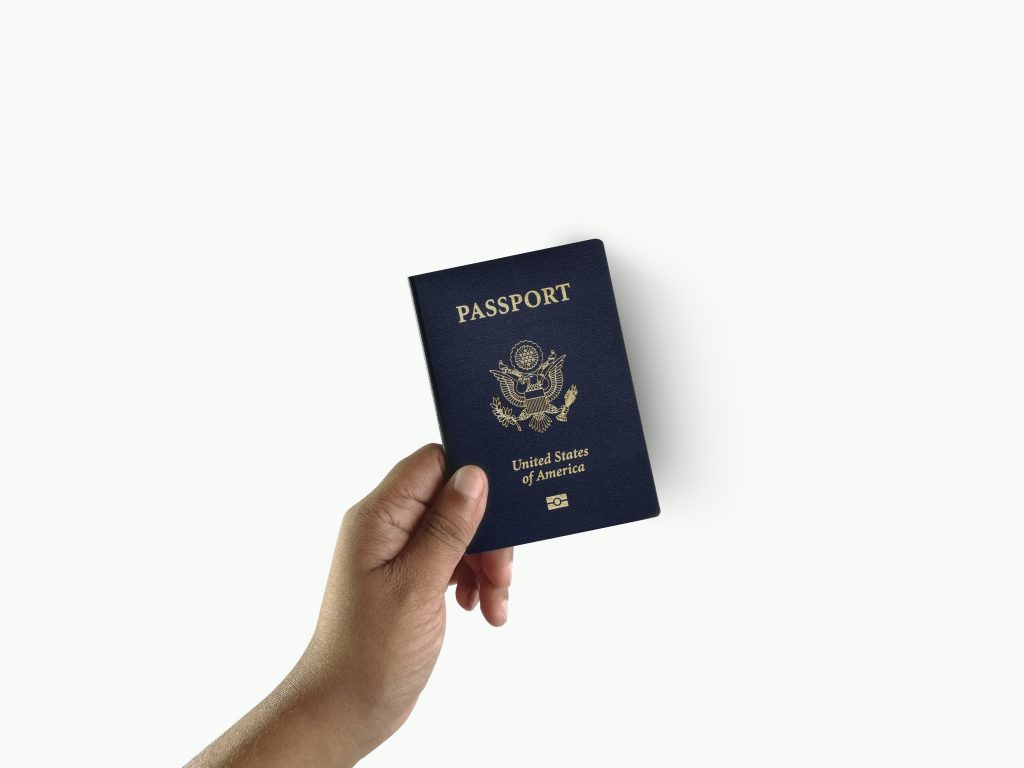
| Becoming a citizen provides more opportunities for things like travel and work; “A passport isn’t just a piece of paper, but it means I can travel to other countries and serve others,” shared Aimee. But citizenship also allows for greater influence stateside, like the right to vote and have a voice in the formation of our communities. Aimee is particularly excited about her newfound suffrage; “I am super excited about being able to vote. I like to advocate for people’s rights but I never got to do it… I never got to express my opinion in that way.” The work of guiding immigrants through the citizenship application process is an act of justice, one our Immigration Legal Services team has been engaging in for decades. We have offered citizenship classes in the past, and now our team manages cases one by one as they offer specialized representation and citizenship application support for qualified individuals. In 2021, our team in King County worked with 826 people from 73 different countries, as they supported different immigration needs, like Aimee’s naturalization process. “I can finally say I am a citizen of a country!” she declared after 24 years without any citizenship. To learn more about the scope of our legal services and how you can best advocate for those pursuing citizenship, visit our website below. |
Liz Meyer Hett is World Relief Western Washington’s Communications Coordinator and serves her local offices with unified branding, content creation, and digital marketing. She has passions for organization, design, and connecting people.
A Welcome from Ukraine
I had been to Sea-Tac airport many times before, but this night was different. I was now a World Relief staff member, and for the first time, I was meeting a family resettling in the U.S. after being forced from their home country.
The first step was connecting with Ana, the sister of the arriving family. I crept forward in the stop-and-go traffic, inching toward the arrivals. With each stop, I sent a text, “I’m getting closer.” “Should I bring the booster seats in or can I meet at your car?”
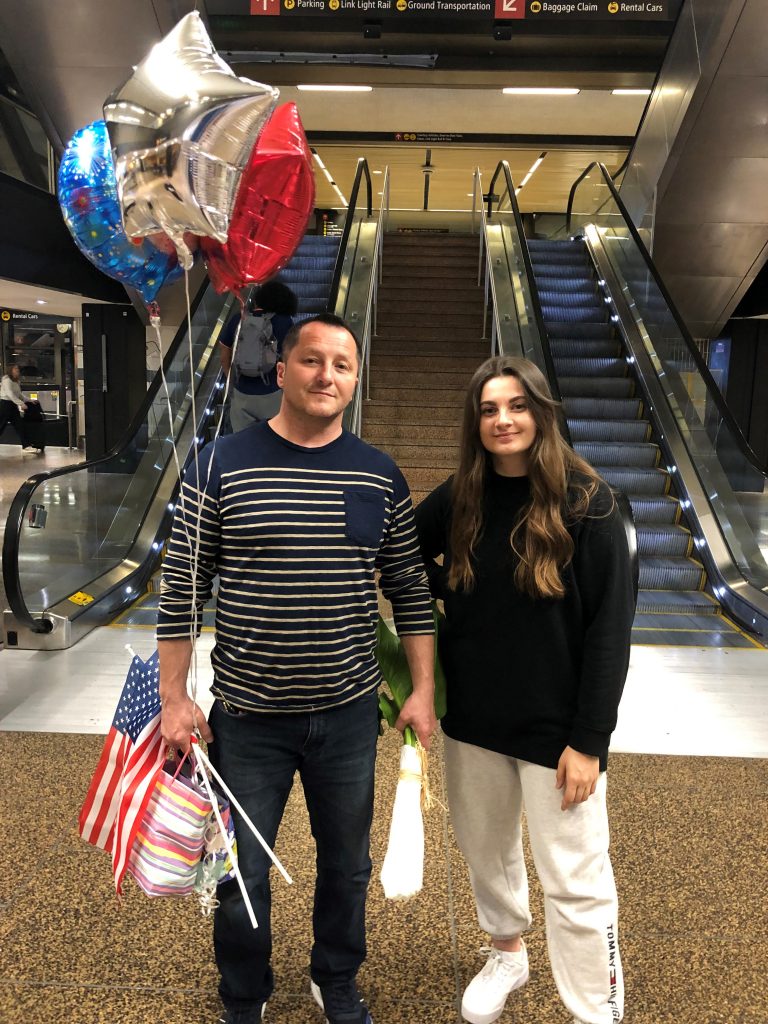
ANA
Ana had just arrived to the U.S. from Ukraine on February 2, 2022 – right before the war broke out. For four years, she had waited for her application to come to the U.S. to be approved, after experiencing persecution for her Pentecostal Christian faith. Now Ana was ready to welcome her sister Luda, her brother-in-law, and her two nieces to their new home.
Ana and her uncle rolled up in their minivan, “Are you Liz?” We transferred the two booster seats, so the 4 and 6-year-old daughters could safely make the final leg of their 40-hour journey. Ana popped out of the car with a smile, two treat bags brimming with candy, a bouquet of Calla Lilies, two U.S. flags, and a bunch of red, white, and blue balloons.
ROMAN
Roman, Ana, and I waited at the bottom of the escalator for the family to arrive, and they recounted some of their stories. Roman had fled Ukraine in 1995 and resettled in the U.S. as a refugee. It pained him to see Ukrainians suffering even after all these years from Russia’s military; “they don’t care if it is soldiers or civilians… they have been raping and killing and bombing…” I could hear the pain and disappointment in his voice as he reflected on the horrors facing those who remained in the country.
His church in the U.S. has gathered together to regularly send money, supplies, and relief to those throughout Ukraine. Tonight, he got to welcome some of his family to safety in the U.S. even as he continues to care for those still in Ukraine.
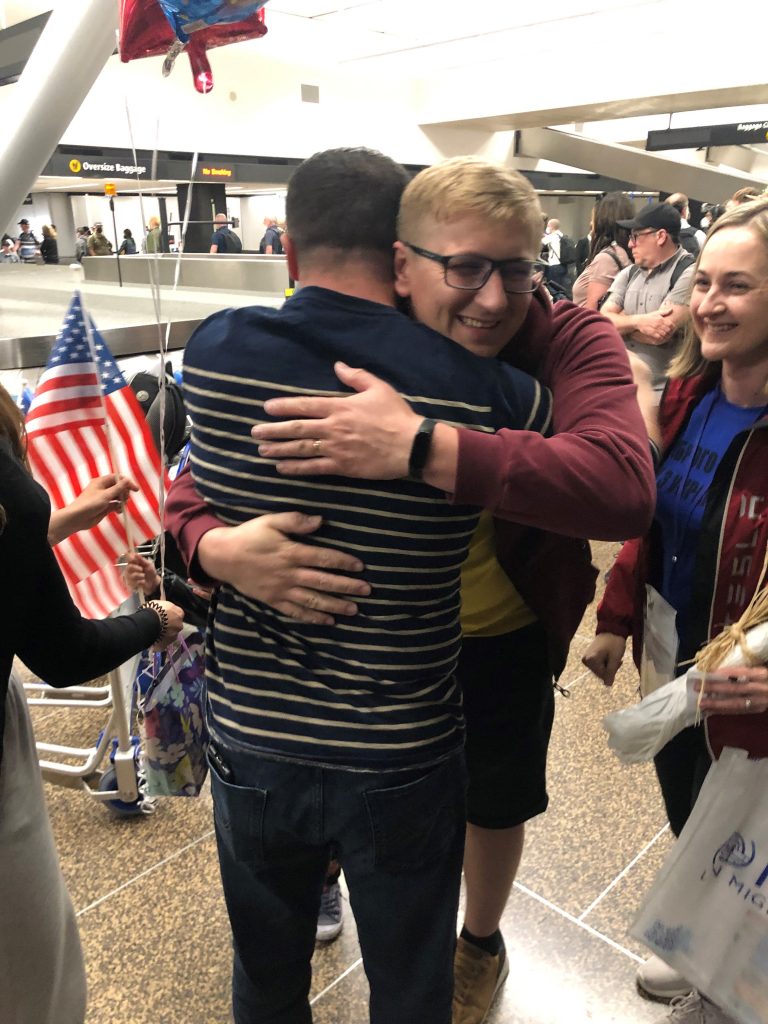
LUDA & FAMILY
Ana was busy texting and making calls, trying to connect with her sister. We got news they bypassed our escalator and made it to baggage claim carousel 5. Ana rushed with the balloons trailing behind her, gently bumping a few passerbys in their wake.
We turned a corner and saw the matching blue and yellow Ukraine shirts Luda and her family had made for their journey. Ana hurried in for a warm hug with her sister. “I can’t believe you are here. Is this really you in the flesh?” she said with a laugh and a few joking probes to confirm her presence. Ana had seen her sister before she had left Ukraine, just about 4 months ago. But 4 months of war had felt like a lifetime – constantly worrying that the bombing would land in her sister’s town.
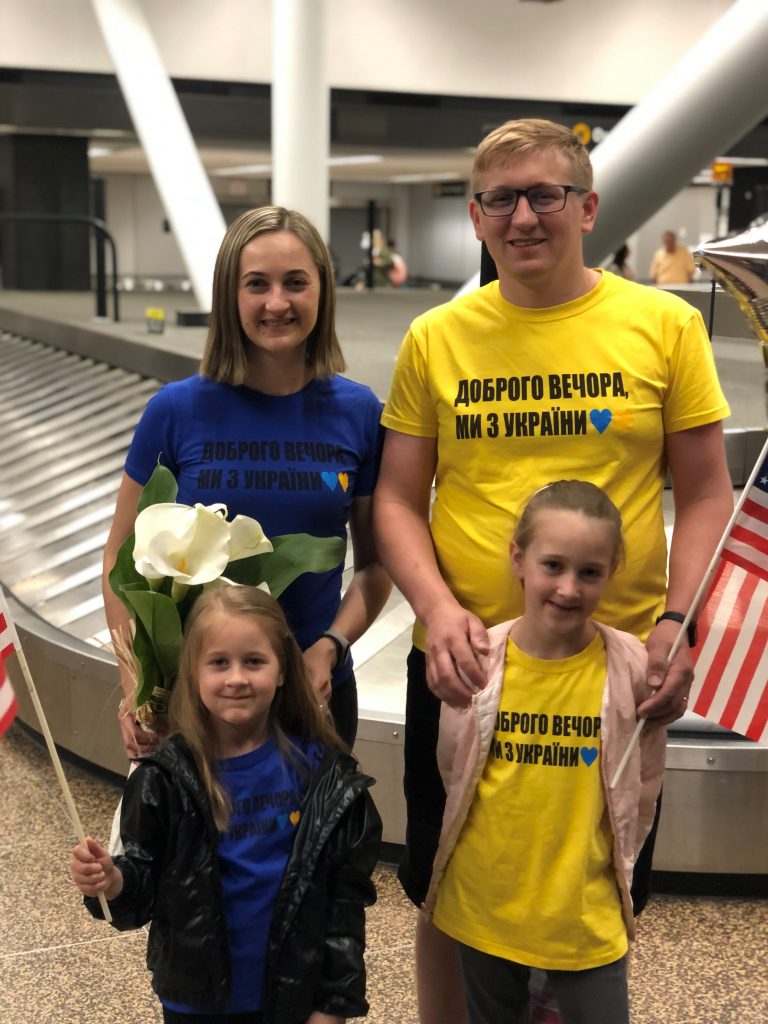
Like Ana, Luda and her family had faced persecution for their faith prior to the war, and had been waiting 4 years to resettle to the U.S. Finally, she was given a travel date in May, but then Russia invaded Ukraine, and the airports throughout the country were bombed and shut down. They didn’t know if they would ever make it.
Luda, her husband, and her two girls fled to Moldova, rescheduled their flights, and finally arrived in Seattle that night of June 9, 2022. The girls embraced their aunt, dug into the candies she shared, and joyously waved the American flags. They shared stories in Ukrainian as we waited for their final bag to pop out on the carousel.
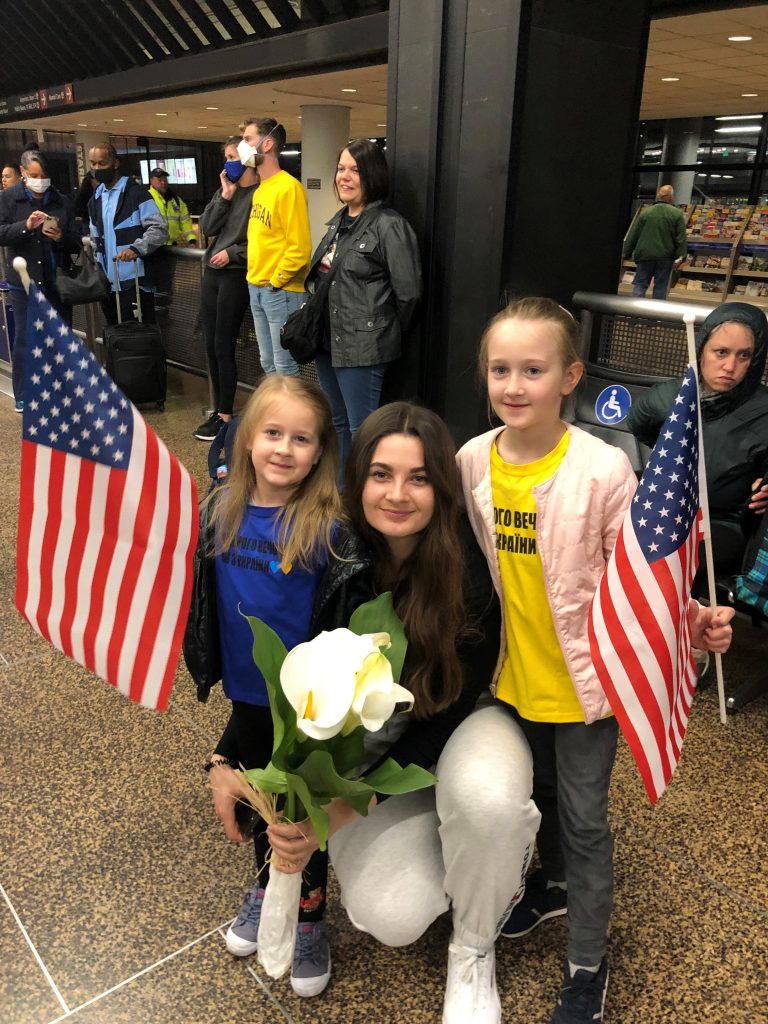
LIZ
For me, I stood by taking it all in, knowing the privilege it was to share this important moment with these families. I was an outsider, but the welcome they gave me into their family in that moment showed me a piece of what reciprocal welcome and hospitality is all about. It wasn’t about me bringing booster seats or saving the day with my theoretical knowledge of the airport.
I received hospitality with the piece of strawberry candy Ana shared with me, “these were my favorite growing up.” It was them asking me multiple times if I wanted to be in the picture as if I was a part of their family. It was Luda starting to go for a hug when I had extended a hand to say “Welcome to the U.S.”
I have a lot to think about this World Refugee Day. Being a community of welcome is giving and it’s receiving. It’s tired hugs after a long journey, sitting in traffic at the airport, and bunches of balloons. It’s the many months and years of building relationships and walking alongside each other as neighbors.
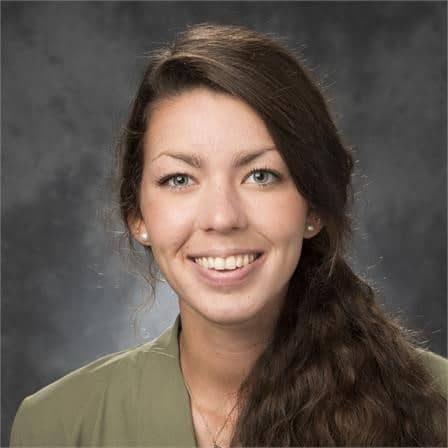
Liz Meyer Hett is World Relief Western Washington’s Communications Coordinator and serves her local offices with unified branding, content creation, and digital marketing. She has passions for organization, design, and connecting people.
Your Family is Coming: A Refugee Family’s Long Road to Reunion
Every day, people leave their homes due to persecution, violence, conflict, and climate-related factors. Their journeys to safety are often marked by loss, separation, and worry for those left behind.
For ten years, Ibrahim was separated from his family. This is their story of enduring hope. It’s a beautiful example of one refugee family reunited after a long time apart.
An Impossible Decision
Ibrahim was born and raised in the Darfur region of western Sudan. He worked a variety of jobs — housekeeping, construction, office administration — in order to provide for his family. There, he lived with his wife, three children, and a baby on the way.
While Ibrahim loved his home and community, conflict left him feeling uneasy. He was concerned for his family’s safety.
Darfur’s ethnic disputes and limited resources have fueled a decades-long conflict. In 2003, a rebel group launched an insurrection in Darfur. The group protested what they considered to be the Sudanese government’s disregard for non-Arab ethnic groups in the region. In response, the government armed ethnically Arab militias to combat rebels in Darfur.
Despite international attempts at peacebuilding and intervention, the conflict worsened. Militias threatened the lives and livelihoods of non-Arab civilians. They burned down thousands of villages, committed sexual violence, and blocked aid organizations from delivering much-needed food and medical supplies.
In 2013, a renewed wave of violence gripped the region. In the face of this conflict, Ibrahim made the heart-wrenching decision to flee Sudan. He left behind his wife and children, in hopes of finding help and a longer-term solution for them all.
“There was too much killing, too much fighting,” Ibrahim told World Relief. “It was impossible to live.”
Seeking Safety
Ibrahim arrived in Jordan hoping to find help. He registered with the U.N. High Commissioner for Refugees (UNHCR), meticulously completing his paperwork.
“I always wrote my kids’ names as my family on all the papers — all the dates of birth and everything,” Ibrahim said. His wife and children, still in Sudan, needed to be included in his case. His hope was that they would be resettled in a new country with him.
Ibrahim found work, sent money home to his family, and waited.
After two years, Ibrahim gained approval for resettlement in the U.S. He passed all required security and health screenings, but his family was still in Sudan. They were unable to travel with him and the family remained separated.
With help from the International Organization for Migration (IOM), Ibrahim flew to the U.S. in 2016, where the World Relief Triad office welcomed him to North Carolina.
Ibrahim remembers feeling like he had escaped death.
“When I arrived, I was so grateful for World Relief because they helped me with everything,” Ibrahim said. “They helped me with a place to stay. They were able to find work for me, and they helped until I felt that I could do things for myself.”
And yet, as Ibrahim rebuilt his life in the U.S., he never stopped thinking of his wife and children, still stuck in Sudan. They frequently spoke over the phone — and Ibrahim continued to hope.
“I couldn’t really rest or enjoy all the blessings I had because I kept on thinking about them all the time,” Ibrahim said. “I never felt complete.”
Hoping and Waiting
Now in the U.S., Ibrahim continued working with IOM in the hopes of bringing his family to North Carolina. He was persistent, calling for updates whenever he could.
With IOM’s help, he was eventually able to secure interviews for his wife at the U.S. embassy in Khartoum, the capital of Sudan. Still, the process crept forward slowly.
Then, in 2019, just when everything finally looked ready to move forward, Ibrahim encountered another obstacle — the president of the United States announced a new executive order banning Sudanese people from traveling to the U.S., Ibrahim’s family included.
The officials said “Everything is correct, all the papers are the way they’re supposed to be. There’s just some rules that they’re not allowing people.”
He began to doubt whether he would ever see his wife and children again. “I almost lost hope,” he said.
But then, in 2021, he got a call. A new U.S. presidential administration had reversed the executive order. Over the phone, he heard the long-hoped-for words: “Your family is coming.”
Ten years after Ibrahim had to leave his family behind in search of safety, after years of hoping and waiting, they would be reunited at last.
Reunited
In February 2022, Ibrahim gathered with staff and volunteers from World Relief Triad at the airport to welcome his wife and four children to North Carolina.
“I broke down in tears because I hadn’t seen them in 10 years, and now they’re here, and it’s real,” Ibrahim said.
“The little one that I left was only three months; when he came, he was 10 years old. I cannot describe how I felt — I was at the point of thinking maybe I will never see them again.”
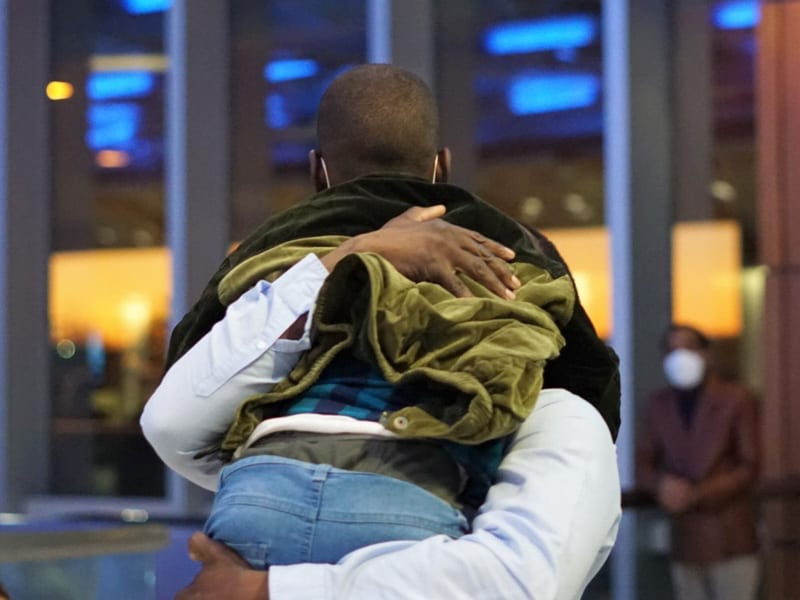
Now, with his family finally together again, Ibrahim has new hopes.
“My hopes are for my kids,” Ibrahim states. “For them to get the right education, for them to be able to be good people. I want them to make something for themselves and make me proud… for them to benefit themselves and our new country — the United States.”
Remembering Those Left Behind
Even as Ibrahim and his family continue building their new life together in the U.S., he often remembers Darfur and the family, friends, and neighbors they had to leave behind.
“People are really suffering there. They don’t have food, they don’t have water, they live in very unsafe, unhealthy conditions,” he said.
The UN estimates 2.5 million people are living in displacement camps across Darfur, and 6.2 million people will need humanitarian assistance in the region within the next year. The same factors — war, violence and persecution — that drove Ibrahim and his family to find safety are still impacting people in Sudan today.
At World Relief, we recognize that addressing the drivers of mass displacement requires a multi-faceted and holistic response. In Sudan, World Relief is on the ground providing humanitarian assistance and investing in development and peacebuilding efforts to address the underlying factors contributing to conflict and displacement.
Together, We Can Respond
Building a just world means coming alongside families like Ibrahim’s once they’ve reached the U.S. and it means finding lasting solutions to the problems that force families to flee in the first place.
For Ibrahim, his hope for safety and brighter futures for those still in Darfur endures — “I really would like for them to… have a better life for themselves and for their kids.”
Together, we are taking action, hoping and praying for lasting solutions for displaced and separated families like Ibrahim’s both in the U.S. and in countries around the world.
World Relief Chicagoland relies on partners and volunteers like you to help build welcoming communities. Join us on the path to hope, transformation, and lasting change alongside refugees and immigrants like Ibrahim.

Kelly Hill serves as a Content Writer at World Relief. She previously served as Volunteer Services Manager at World Relief Triad in North Carolina before moving to Salt Lake City. With a background in International and Intercultural Communication, she is passionate about the power of story to connect people of diverse experiences.
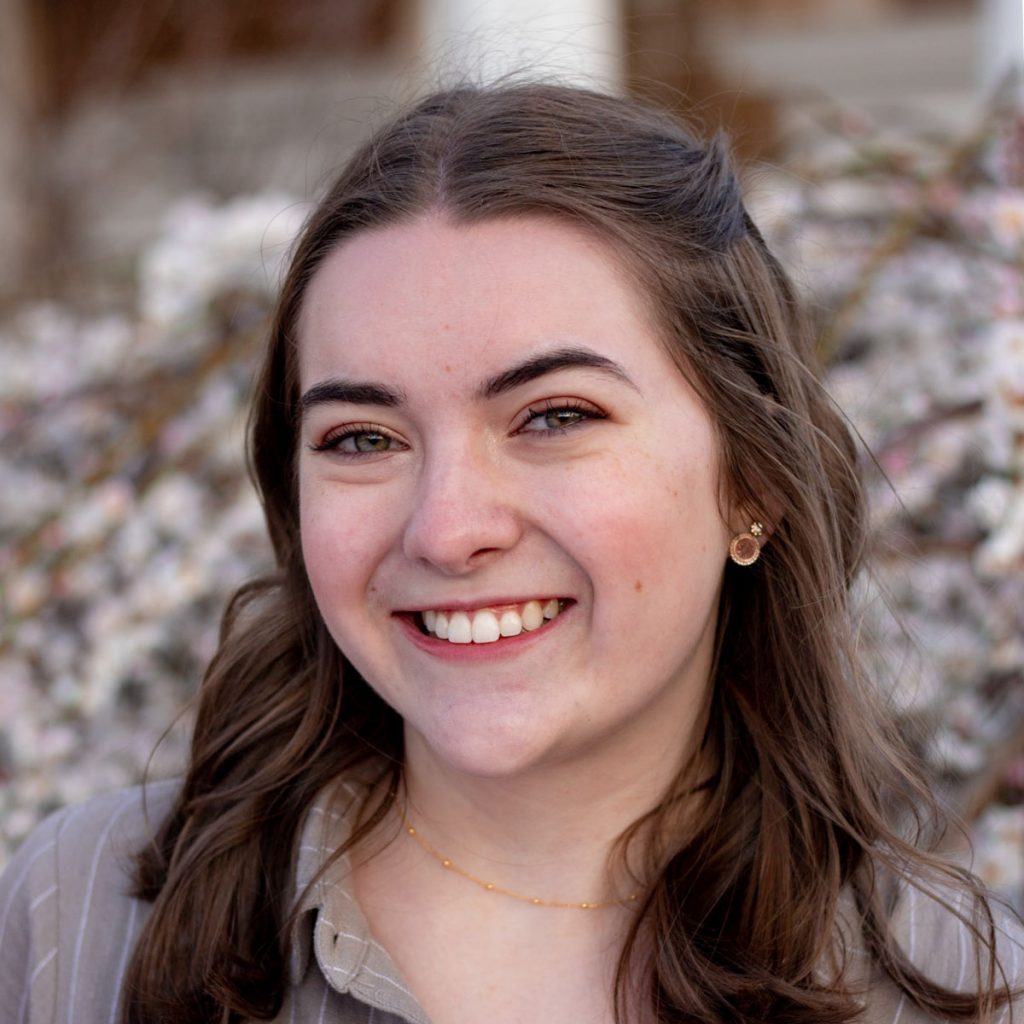
Abby Ray has been serving as the Communications & Advocacy Coordinator at World Relief’s Triad office since September 2021. She works to amplify the voices of clients, staff and community members by empowering them to share their own stories.
From Burma to the U.S.
Saw Sar Kapaw*, pictured above with his wife and son, worked as a lawyer and activist in Burma, also known as Myanmar. He sought out justice and had a passion for his daily work. But on February 1, 2021, everything changed. His fight for justice had just begun.
Burma, which sits just west of Thailand in Southeast Asia, has a history of British colonization, military rule, and internal conflict between ethnic armed groups. A democratic government finally emerged in 2015, and was re-elected by a landslide in late 2020. But then in the middle of the night on February 1, 2021 Saw felt uneasy. Something was not right.
At 2 AM the internet went down, and then the phones stopped working. He could not reach his wife, Yee Min who lived in a neighboring state. The next day, the military paraded into the main city and arrested key democratic leaders, making it clear the coup had begun. Saw was trapped with his colleagues, unable to go outside for days.
Seeking Justice
“After those days, the military said ‘you can go back to your hometown and stay freely,’ but we knew that with this condition, nothing is really like that because the people don’t accept the military coup. I had two options – go back to [my hometown]… or go back to Yangon and participate in the underground movement,” shared Saw.
Saw Sar Kapaw knew he had to advocate for democracy and freedom throughout his country, so he went on to the country’s largest city, Yangon, where he participated in the protests and supported those who were leading the movement.
Before long, violence spread wide as the military arrested, attacked, and killed those supporting and leading the pro-democracy movement. It became more and more dangerous to stand against the coup. Saw shared that “many of my friend’s houses were burned by the military.”
Saw fled to Thailand temporarily so he could continue his remote, underground work fighting for his people’s freedom. The U.S. embassy encouraged him to resettle in the U.S. and supported the process. Saw Sar Kapaw’s wife, Yee Min, and their two-year-old son were finally able to join him in Thailand, ready for their journey to the U.S.
Studying English
World Relief welcomed Saw and Yee Min to the U.S. on September 1, 2021 at Sea-Tac Airport. “First, we stayed in Auburn with a host family… they were very kind to us. We learned the American culture – how they eat, how they care for their children, how they spend their time.”
Saw’s family found a place of their own to live and he started a job at a hotel alongside all the hours he spent working online to support the movement in Burma. For the first 6 months, they felt rather isolated in their new lives. But slowly they began to settle in and build community.
One place they started to find community was at World Relief’s English as a Second Language (ESL) classes. Saw and Yee Min meet with other classmates on Zoom twice a week and have self-guided lessons twice a week. “Even our son is taking classes. They have a family literacy class, so he has a chance to meet friends from Afghanistan and Ukraine” shared Saw.
The classes are safe places where refugees and immigrants coming from all ranges of skill levels can learn English. Saw emphasized how his class was practical and helpful for his family’s daily life; “for the beginners like us, Americans speak very fast. So until now, I didn’t understand what they are speaking. In World Relief’s ESL class they speak very slowly; they try to understand us. Sometimes they use body language so we can understand what they are saying”
Saw Kar Kapaw is strengthening his English skills and improving his vocabulary, grammar, and sentence structure, not just for his daily life, but for the pursuit of justice. Saw plans to become certified as a paralegal in the U.S. so he can continue his work in the U.S. advocating for justice and fighting for democracy.
A Refugee’s Journey to Belonging: Jerome’s Story
**UPDATE TO JEROME’S STORY.**
In May of 2022, Jerome graduated with a Bachelor of Science in Social Work!!! We celebrate Jerome and his accomplishments!
“What’s going to happen to me? Who’s going to receive me? How am I going to live?” These were all questions asked by World Relief staff member, Jerome Bizimana, featured in the video below.
Jerome became a U.S. citizen after his struggle to escape hate and violence.
At times it felt like a hopeless quest for peace. How did he persevere? How did he rebuild his life in the United States and overcome challenges along the way? Watch this video interview with Jerome to find out. And listen to his words to become a witness of Jerome’s journey to belonging.
Refugee Resettlement
For more than 40 years, World Relief has worked to resettle refugees and create communities of welcome throughout Chicagoland. You can be part of this important work welcoming new neighbors like Jerome! Learn about World Relief Chicagoland’s work resettling refugees here and watch other videos of hope on our YouTube channel!
The journey is long. But together, we can create communities of belonging where everyone can thrive. Will you join this movement of peace alongside people like Jerome?
More like this:
Volunteer Impact Video: Abdul and Yao
Watch: Welcome Begins with You
4 Ways to Read, Watch, and Listen to Powerful Immigrant and Refugee Stories
A 3-Minute Peek Into The 2021 Global Gala
To access the full-length Global Gala video will all the stories, please email chicagoland@wr.org to request access.
To make a donation to help immigrants and refugees
rebuild their lives click the donate button at the top of the screen.
Thank you!
Spotlight on International Women’s Day
Honor International Women’s Day by watching this powerful event featuring immigrant women from all over the world!
Make a donation today to help other women thrive.









